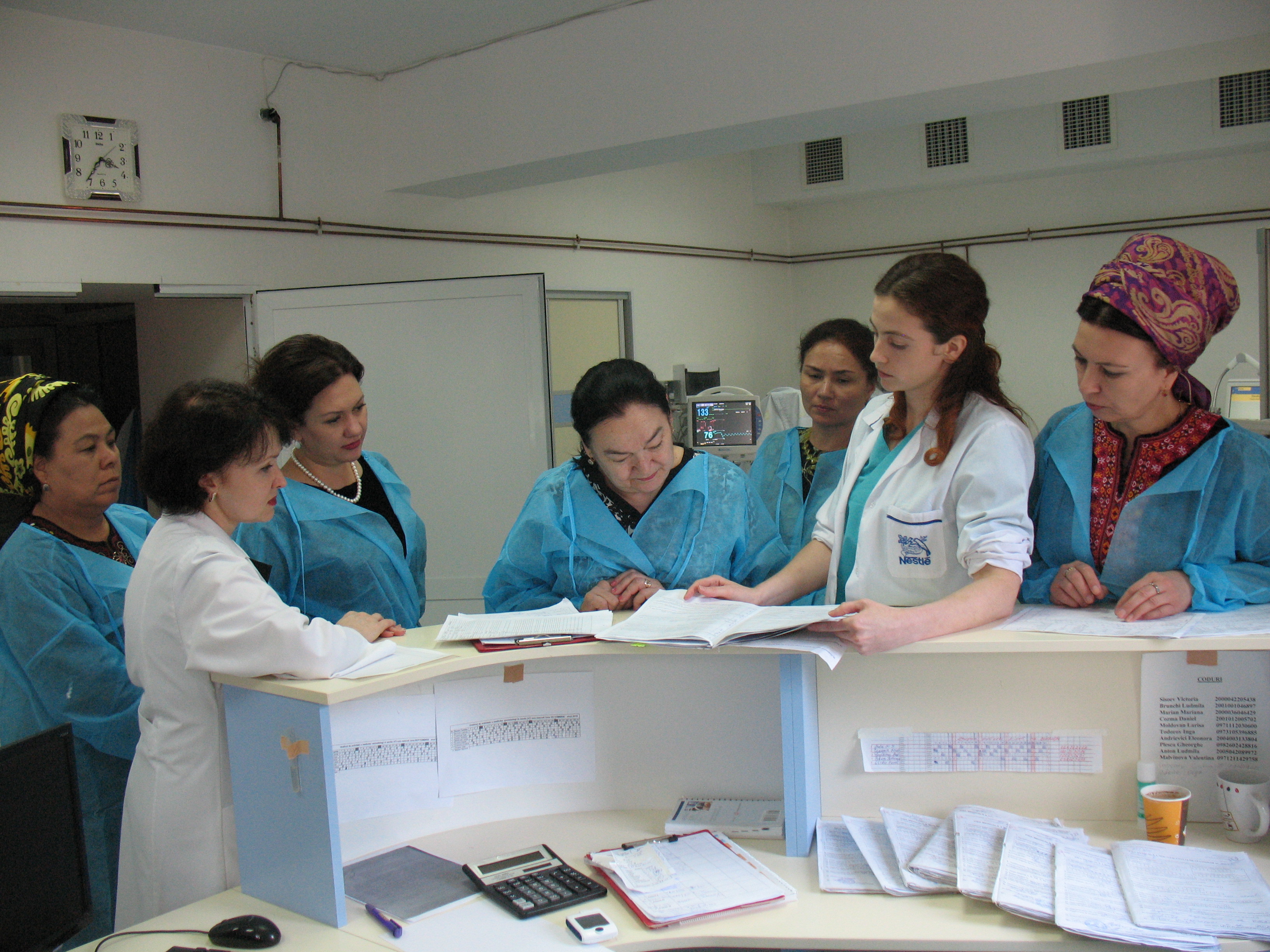 Improving the Effectiveness of Maternal Health Care
Partnership between Turkmenistan and Republic of Moldova for knowledge exchange and capacity development
Improving the Effectiveness of Maternal Health Care
Partnership between Turkmenistan and Republic of Moldova for knowledge exchange and capacity development

Challenges
In 2010, maternal mortality ratio (MMR) in Turkmenistan was estimated at 67/100,000 live births. The causes of maternal death included severe bleeding, eclampsia and obstructed labour, that could be prevented through the provision of timely and quality emergency obstetric care. While basic obstetric service delivery points provided comprehensive emergency obstetric care (EmOC), there was a need to standardise clinical practices and establish a differentiated set of maternal health services and referrals across the country in order to improve quality of care for mothers and new-borns and reduce maternal mortality. Moreover, apart from outdated clinical protocols and guidelines, weak capacity of specialists and uneven distribution of medical equipment were contributing to a disruption of timely service provision with negative impact on maternal health.
Towards a Solution
To help improve the quality of maternal health care in Turkmenistan, especially the delivery of EmOC services, the United Nations Population Fund (UNFPA) facilitated a cross-country South-South cooperation exchange between Turkmenistan and the Republic of Moldova in the area of maternal health and provided technical and financial assistance throughout the entire process.
Following several rounds of consultation with key stakeholders, the Republic of Moldova was selected as a suitable country for Turkmenistan to exchange with and learn from based on the following factors:
- the strong capacity of Moldovan obstetricians in developing and implementing clinical protocols;
- evidence of improvements and maintenance of quality maternal health services even with limited financial resources; and
- shared historical experience of the two countries that includes a similar system of maternal and child health service provision.
The cooperation between the two countries included, among others, transfer of technical expertise from medical experts, study and learning visits to maternal health service provision and training centres, standardising clinical practice in obstetrics and newborn health through protocols and guidelines and setting up a more efficient medical equipment management system.
Results
This South-South cooperation initiative has significantly contributed to increasing the capacity of more than 150 Turkmen obstetricians, neonatologists, medical engineers, midwives in clinical practice and those in academia relating to the improvement of maternal health. UN estimates have shown that maternal mortality has decreased by 50 per cent since 2010. Moreover, the country programme evaluation conducted in 2014 found that the number of comprehensive EmOC services provided increased by 30 per cent, largely due to the introduction of updated clinical protocols and guidelines, as well as improvements in service training.
A comprehensive assessment of the structure and referral system of maternal and child health services concluded the need for a system of differentiated services at each of the three levels of care in every region. The recommendation was carried out and it proved to be cost efficient and to increase the effectiveness of services provided.
The exchange visits were extremely beneficial for Turkmenistan participants in learning about efficient and cost-effective ways in the management of medical facilities and equipment. These resulted in a significant average reduction from 20 to 7 days of non-functioning equipment, thereby contributing to an improvement in provision of maternal health services.
Through the exchange visits, Moldovan specialists also benefited from Turkmenistan’s innovative approaches, such as the provision of regionalized differentiated services. Moreover, partners from both countries have expressed strong interest to continue their partnership and maintain frequent professional contacts and networking. For instance, five Turkmenistan experts were invited by the Republic of Moldova to take part in the 2018 International Congress on Obstetrics and Gynaecology.
Lessons Learned
Standardisation of medical practice, especially in the area of emergency obstetric care, is crucial for achieving long lasting results in improving maternal health. Setting up the standards of clinical care with clear and concise protocols and identifying who should do what and when has proven to be life-saving. A differentiated set of services and medical equipment, as well as human resources based on competencies, skills and knowledge is efficient and effective for providing quality services. Adopting the pre-established standards would be beneficial for countries working towards improving the effectiveness of their maternal health care.
Contact Information
Countries involved
Supported by
Implementing Entities
Project Status
Project Period
Primary SDG
Secondary SDGs
Similar Solutions
| NAME OF SOLUTION | Countries | SDG | Project Status | |
|---|---|---|---|---|
A Billion Brains: Smarter Children, Healthier Economies High Level Meeting on South-South Cooperation for Child Rights |
Republic of Moldova, Turkmenistan | 17 - Partnerships for the Goals | Completed | View Details |
Accelerating the Implementation of African Union Treaties in São Tomé and Príncipe South-South learning from the Beninese judicial system’s experience in the application of human rights treaties to its national law |
Republic of Moldova, Turkmenistan | 05 - Gender Equality | Completed | View Details |
Accelerating the Transformational Shift to a Low-Carbon Economy in Mauritius Towards supplying 35 percent of the country’s energy needs with renewables by 2025 |
Republic of Moldova, Turkmenistan | 05 - Gender Equality 09 - Industry, Innovation and Infrastructure 13 - Climate Action | Ongoing | View Details |
Access to Justice through e-Services and Dematerialized Case Management Scaling up connectivity and unlocking the digital potential of judicial institutions to enhance access to justice for all |
Republic of Moldova, Turkmenistan | 05 - Gender Equality | Completed | View Details |
ACP Business-friendly Supporting business-friendly and inclusive national and regional policies, and strengthening productive capabilities and value chains |
Republic of Moldova, Turkmenistan | 08 - Decent Work and Economic Growth 17 - Partnerships for the Goals | Ongoing | View Details |
